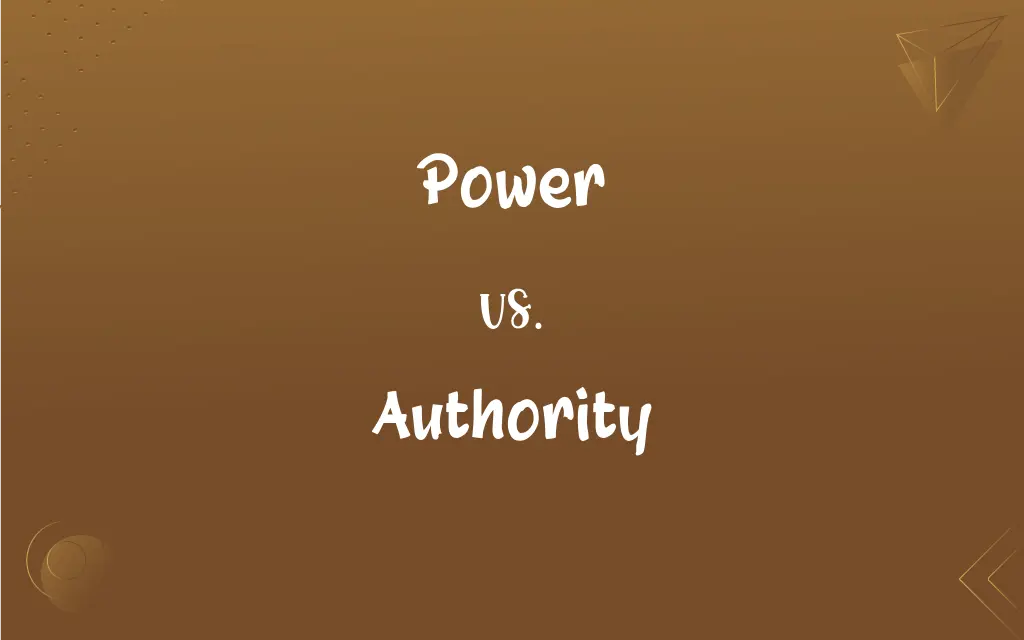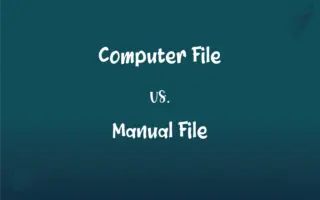Power vs. Authority: What's the Difference?
Edited by Aimie Carlson || By Harlon Moss || Updated on October 12, 2023
Power is the capacity to influence others’ behavior, while authority is the rightful use of power, typically through recognized roles or legal means.

Key Differences
Power encompasses the ability to impact others and events, using various means. Authority is embedded in designated roles, offering a legitimate way to exercise power. Power may not always derive from a lawful or accepted source, yet it still can influence outcomes. On the other hand, authority is typically bound by certain norms and regulations, creating a guideline for how it should be used.
Power can manifest through different mechanisms: coercion, manipulation, or incentivization, to name a few. Authority typically adheres to an established structure, like a legal or organizational framework, enabling a person to guide or control others. The manifestation of power may not be bound by ethical or societal norms, which differentiates it starkly from authority. Authority often embodies a social contract, wherein individuals consent to its presence, guided by the expectation of order and stability.
Power can be wielded by anyone possessing the resources, charisma, or capabilities to manipulate scenarios or individuals. In contrast, authority is generally relegated to specific roles or titles within a structure or system, like a CEO in a company or a judge in a court. An individual with power may not necessarily have the legal or moral right to exert influence, but they might still achieve their goals. Authority, in its traditional form, is supported by a framework that validates its legitimacy, and it often comes with an associated set of responsibilities and expectations.
Power and authority both navigate the realms of control and influence, yet they are distinct in their derivation and application. Power can be overt or covert, manifesting through various forms and being exerted in diverse contexts, without a requisite need for validation or legality. Authority is frequently recognized and accepted by those it governs, with its legitimacy deriving from established laws, norms, or traditions, and is exercised within defined boundaries. Thus, while both power and authority involve influencing others and determining outcomes, they diverge significantly in their essence and operationalization.
Comparison Chart
Basis
Can be based on influence, resources, or force.
Rooted in accepted roles, legality, or consent.
ADVERTISEMENT
Legitimacy
Not necessarily recognized as legitimate.
Generally accepted and recognized by those subjected to it.
Restrictions
Often operates with fewer restrictions or guidelines.
Typically bound by certain rules, norms, and ethical guidelines.
Stability
May be unstable or transient.
Usually stable due to structured recognition.
Accountability
May lack direct accountability or checks.
Often has systems for accountability and checks in place.
Power and Authority Definitions
Power
Power in physics refers to the rate at which energy is transferred or converted.
The turbine has the power to generate enough electricity for the whole village.
ADVERTISEMENT
Authority
Authority is the sanctioned right to make decisions and enforce obedience.
The mayor has the authority to enforce local ordinances.
Power
Power can denote a state or country regarded as possessing influence and control.
Historically, Britain was a significant colonial power.
Authority
In literature, an authority can be a reliable source or reference.
The scientist is an authority on environmental issues.
Power
Power is the capacity to exert influence over people or situations.
The charismatic leader demonstrated significant power over his followers.
Authority
Authority refers to the power assigned to a person or organization due to their position or status.
The police have the authority to uphold the law in society.
Power
In mathematics, power indicates the number of times a number is multiplied by itself.
Two to the third power equals eight.
Authority
In the context of debate or discussion, authority represents the persuasive force of a narrative or speaker.
Her extensive experience lent authority to her words during the seminar.
Power
In the context of social dynamics, power reflects a hierarchy where influence is exerted.
The power dynamics within the corporation shifted with the change in management.
Authority
It can refer to a body of people with the official duty to make and/or enforce laws.
The local authority decided to create more parks in the city.
Power
The ability or capacity to act or do something effectively
Is it in your power to undo this injustice?.
Authority
The power to enforce laws, exact obedience, command, determine, or judge.
Power
Often powers A specific capacity, faculty, or aptitude
Her powers of concentration.
Authority
One that is invested with this power, especially a government or body of government officials
Land titles issued by the civil authority.
FAQs
Can power exist without authority?
Yes, power can exist without authority, as it doesn't necessarily require social or legal approval to be exercised.
How does authority differ from power?
Authority is the legitimate or socially accepted use of power, often granted through a recognized role or law.
Can power be subtle?
Yes, power can manifest in both overt and subtle ways, such as through manipulation or soft influence.
Can someone have power without realizing it?
Yes, an individual may unconsciously exert power over others due to charisma, knowledge, or other influential attributes.
Does authority always involve power?
Yes, authority invariably involves some degree of power as it grants the right to make decisions and enforce compliance.
Is authority always related to a position or title?
Generally, yes. Authority is often related to a recognized position or title within a structured entity.
What is “soft power”?
Soft power involves shaping others’ preferences and attitudes through attraction and persuasion rather than coercion.
Can authority be negative?
Yes, authority can be perceived or exercised negatively, especially if it suppresses or constrains individuals unjustly.
How does power play out in daily interactions?
Power can subtly influence daily interactions through dynamics of influence, manipulation, or control among individuals.
Can authority be delegated?
Yes, authority can be delegated from a person or entity with recognized authority to another individual.
What is power in a sociological context?
Power refers to the capability or capacity to influence others’ actions or behaviors, often to achieve a particular outcome.
Is all authority formal and structural?
Not always. Authority can be both formal (legal or organizational) and informal (acknowledged without official status).
What is “abuse of power”?
Abuse of power occurs when an individual misuses their capacity to influence, control, or manipulate situations or people unethically or unjustly.
Can power lead to authority?
Yes, power, especially when exercised effectively and accepted by others, can potentially lead to authority.
What is “legitimate power”?
Legitimate power derives from a recognized position or role within a structured entity, similar to authority.
What is “coercive power”?
Coercive power involves forcing someone to comply through threats, punishment, or negative reinforcement.
What is “expert power”?
Expert power originates from a person’s skills, knowledge, and expertise, enabling them to influence others within a specific domain.
Can a person have authority without power?
Technically, a person with authority inherently possesses a certain degree of power, as authority provides the sanctioned right to exert influence.
How is power different in various cultures?
Different cultures may have varied perspectives on power, shaping how it is acquired, respected, and exercised within societal contexts.
Is authority always respected?
Not always. Authority may face dissent or rebellion if it is deemed unjust, unethical, or ineffective.
About Author
Written by
Harlon MossHarlon is a seasoned quality moderator and accomplished content writer for Difference Wiki. An alumnus of the prestigious University of California, he earned his degree in Computer Science. Leveraging his academic background, Harlon brings a meticulous and informed perspective to his work, ensuring content accuracy and excellence.
Edited by
Aimie CarlsonAimie Carlson, holding a master's degree in English literature, is a fervent English language enthusiast. She lends her writing talents to Difference Wiki, a prominent website that specializes in comparisons, offering readers insightful analyses that both captivate and inform.































































